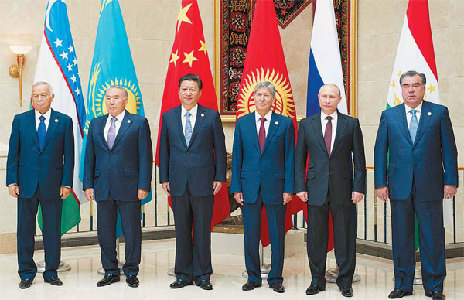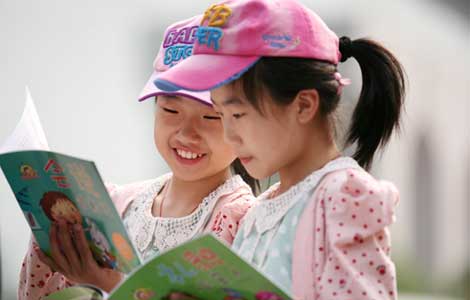Advancing human rights development
Updated: 2013-09-14 08:10
By Cai Mingzhao (China Daily)
|
||||||||
Editor's note: The Sixth Beijing Forum on Human Rights was held on Sept 12-13 and attended by human rights experts and scholars from across China and the world. Following are the speeches delivered at the forum by Cai Mingzhao, minister of State Council Information Office; Luo Haocai, president of China Society for Human Rights Studies; and Huang Mengfu, vice-chairman of the 11th CPPCC National Committee and chairman of China Foundation for Human Rights Development:
The Chinese Dream promotes human rights
Cai Mingzhao, minister of the Information Office of the State Council
Today, we are gathered to welcome the opening of the Sixth Beijing Forum on Human Rights, which is co-sponsored by the China Society for Human Rights Studies and the China Foundation for Human Rights Development. Undoubtedly, it is of positive significance that human rights experts and scholars in the international human rights field from many countries in the world have assembled together in this golden season to plan human rights development. On behalf of the State Council Information Office of China, I would like to express warm congratulations to the opening of this forum, and sincere welcome to friends in attendance.
The full enjoyment of human rights is a common pursuit of mankind. For long, people of all countries have made unremitting efforts and thus important progress in striving for human rights, but it is still a long run to reach the sublime goal of full enjoyment of human rights. This session of the Forum is themed "Construction of Environment for Sustainable Human Rights Development". With abundant contents and profound meanings, this theme especially deserves our deep speculation and research.
Human rights development is closely related to the development of the country and society involved, and the sustainable development of the country and society is the foundation of sustainable human rights development. How to construct the environment for sustainable human rights development has become an important subject for the governments of all countries today.
Ladies and gentlemen,
The Communist Party of China and all levels of government departments of China have not only resolved to respect and guarantee human rights, but also put it into practice. Both the CPC and the Chinese government consider the respect and protection of human rights as an important principle in governing the country, combine the principle of universality of human rights with the reality in China, and in reference to the situation of China, give priority to the guarantee of people's rights to subsistence and development.
For years, China has adhered to economic construction as a central task, and combined the cause of human rights development with economic construction, political construction, cultural construction, social construction and ecological civilization construction, trying hard for all-round, harmonious and sustainable development. In doing so, it has found a path of human rights development suitable to the situation of China, and the levels of human rights protection have been constantly upgraded.
For economic construction, China engages in economic development to boost employment both in urban and rural areas, increase residents' incomes and households' property incomes, and improve people's living conditions, involving their basic everyday needs. By doing so, it has protected the rights and interests of the disadvantaged groups, and practically guaranteed citizens' economic rights.
Here, I have a set of data as evidence. In 2012, the proportion of China's GDP to the world increased from 1.89 percent (by the exchange rate of US dollars) in 1980 to 11.57 percent, and its per capita GDP grew from $205 (by the exchange rate of US dollars) to $6,064, with an increase of nearly 30 times. In comparison, the proportion of population in poverty decreased from 84 percent in 1980 to 13 percent in 2012.
For political construction, China insists on actively and properly pushing forward its political structure reform, spreading socialist democracy, and speeding up the construction of a socialist country of governance by law. China has strived for improving its democratic system, enriching its democratic forms, extending citizens' orderly participation in politics, and guaranteeing that citizens exercise democratic rights by law.
Meanwhile, it has constantly deepened the reform of its political system, boosted the reform of its judicial system and work mechanism, and guaranteed people's enjoyment of extensive rights and freedom by law. At the end of 2012, more than 98 percent village committees all over the country realized direct selection, and villagers' average participation reached 95 percent. By the end of 2012, China had formulated the current Constitution and 242 valid laws, 721 administrative rules and regulations, and 9,200 local regulations. A socialist legal system with Chinese characteristics has been formed. That is an important mark for the cause of human rights development in China, and the protection of human rights in China has been legalized.
For cultural construction, China continues to deepen the reform of its cultural system, emancipate and develop cultural productive forces, and activate the cultural creativity of the whole nation. As a result, it has unprecedentedly improved citizens' rights to enjoy cultural achievements, participate in cultural activities and cultural affairs management, make cultural creation and have their cultural achievements protected by laws.
Take the cultural information service citizens have enjoyed for an example. At present, all administrative villages and 95 percent natural villages with more than 20 households have access to telephone, all towns and townships have basic access to the Internet, all towns and townships and 88 percent administrative villages have access to broadband. Radio broadcast programs have a comprehensive coverage of 97.5 percent of the total population, and television programs have a comprehensive coverage of 98.2 percent of the whole population.
For social construction, China is practically solving such most practicable issues that are most directly related to the interests of the people and concern the latter to the maximum, and guaranteeing the fundamental interest of the largest possible number of the people; accordingly, the citizens' rights to social insurance, health and education have received better protection. China lays emphasis on the guarantee and improvement of people's living conditions, and further improves basic public service systems.
Accordingly, it has achieved remarkably in the construction of social insurance systems, and the levels and average levels of basic public service have been obviously increased. With years of unremitting efforts, China has institutionally realized the overall coverage of basic endowment insurance and basic health insurance both in urban and rural areas. By the end of 2012, the people participating in various endowment insurance numbered up to 790 million, and the people participating in various health medical insurance exceeded 1.3 billion.
For ecological civilization construction, China insists on developing the ecological concept of respecting, conforming to and protecting nature, adheres to the basic national policy of environmental protection, gives an eminent place to the construction of ecological civilization, endeavors to build a beautiful China, and practically protects citizens' rights and interests in terms of the environment.
From 2008 to 2012, China eliminated 117 million tons of backward iron smelting capacity, 78 million tons of steel smelting capacity and 775 tons of cement productive capacity; its energy consumption of unit GDP decreased 17.2 percent, its total chemical consumption of oxygen and total emission of carbon dioxide respectively decreased 15.7 percent and 17.5 percent. In 2012, fine particulate matters (PM2.5) were included as a regular supervision index of air quality.
Ladies and gentlemen,
For human rights development, there is no best, only better. The cause of human rights of China has attained enormous achievements obvious to everyone, but China is still the largest developing country in the world, and still faces such problems as an excessively large population and great regional disparities. Its environmental and ecological protection is enduring considerable pressure, and its development is still threatened by imbalance, disharmony and unsustainability.
In the development of its various causes, there are still many problems concerning the actual interests of the people, and the improvement of people's living conditions and the protection of human rights are still facing many challenges. All these have to be solved with more strenuous efforts.
China has formulated two sessions of the National Human Rights Action Plan. The National Human Rights Action Plan (2009-10) was implemented on schedule, and all goals in the Plan have been achieved, in particular, about 35 percent constraint indexes and more than 50 percent indexes concerning people's living conditions have been fulfilled ahead of the schedule or over-fulfilled. Now, the National Human Rights Action Plan (2012-15) is being put into practice.
Last year, the 18th National Congress of the CPC was successfully held. After "human rights" were written into the Constitution of the People's Republic of China, the plans for national economic and social development and the Constitution of the CPC, this Conference once again established the "practical respect and protection of human rights" as one of the goals for the building of a better-off society.
This Conference specifically proposed to build a better-off society by the 100th anniversary of the founding of the CPC (2021), and a wealthy, powerful, democratic, civilized and harmonious modernized socialist country by the 100th anniversary of the founding of the PRC (2049). This Conference marks a historic starting point of the socialist cause with Chinese characteristics, and the beginning of a new era of the cause of human rights development of China.
The goal of the two "100th anniversaries" and the Chinese Dream about the prosperity of the country, the invigoration of the nation and the happiness of the people are the simple ideal and good wishes that the Chinese nation has persistently sought, and the common pursuit of people of all ethnic groups of China. The Chinese Dream has the same source as the cause of human rights in China does, and is the organic unity of the State's dream, the nation's dream and individuals' dream.
In realizing the Chinese Dream, each Chinese can live a wonderful life, make his or her dream come true, grow up and make progress together with the country, allow himself or herself an all-round development, and better enjoy various basic rights, so long as he or she grasps his or her opportunity.
The prosperity of the country, the invigoration of the nation and the happiness of the people are not only the pursuit of the Chinese people, but also the wish of people of all the other countries in the world. The Chinese Dream is related to and consistent with the dreams of all the other countries and the world. The Chinese Dream not only benefits the Chinese people, but also the whole mankind.
China insists on conforming to overall international situations, and adheres to peaceful, open, cooperative and win-win development. On the one hand, China creates opportunities for the world and provides space and conditions for development. On the other hand, China earnestly undertakes its own international obligations and responsibilities, and is a responsible large developing country.
All along, China has observed the basic principles of promoting and guaranteeing human rights established by international human rights documents such as the Universal Declaration of Human Rights, supported the UN's efforts to promote human rights and basic freedom, constructively taken part in the UN's human rights affairs, earnestly fulfilled the obligations in the light of the conventions it has taken part in, and actively engaged in international exchanges and cooperation in human rights. The international principles of human rights have to be implemented through countries with sovereignty after all.
Due to differences in history, culture, social system and the levels of economic development, each country will certainly have its development mode of human rights, and all countries should learn from each other to improve themselves. On the basis of equality and mutual respect, China is willing to have dialogues and exchanges in human rights with all countries in the world, improve mutual understanding, decrease dissension, learn from each other and make progress together.
Ladies and gentlemen,
Since 2008, the Beijing Forum on Human Rights has been successfully held for six sessions, and obtained a series of very valuable achievements. With the support and participation of experts and scholars in human rights, distinguished personages and governmental officials from all over the world, the Forum has been better and better, with its influence growing, and has become a famous advanced academic platform for international exchanges in the field of human rights.
Through this equal and open platform, people discuss the theories and practice of human rights that they are commonly concerned with, improving mutual understanding, developing common views, and deepening friendship. In a word, the Forum has made positive contributions to the exchanges and cooperation in the field of international human rights. In the next two days, guests will have discussion around the "Construction of Environment for Sustainable Human Rights Development". I am convinced that through sincere exchanges and profound discussion, people will offer more inspiring ideas, reach more consensuses and collect more wisdom on how to construct the environment for sustainable human rights development.
And last, I wish you to work smoothly and live happily in Beijing, and wish a success to the Sixth Beijing Forum on Human Rights. Thank you.
(China Daily 09/14/2013 page5)

 Beijing backs truce bid in Syria
Beijing backs truce bid in Syria
 Parents support stricter rules on children's books
Parents support stricter rules on children's books
 Ouch ... bee therapy causes a real buzz
Ouch ... bee therapy causes a real buzz
 Faye Wong and Li Yapeng shock fans with divorce
Faye Wong and Li Yapeng shock fans with divorce
 World shows flare at Beijing tourism event
World shows flare at Beijing tourism event
 Yao Ming launches new wine
Yao Ming launches new wine
 'Up' comes to life
'Up' comes to life
 Experts discuss Chinese premier's economic plan
Experts discuss Chinese premier's economic plan
Most Viewed
Editor's Picks

|

|

|

|

|

|
Today's Top News
Growth model shift beneficial for Europe, China
End to QE to 'split' emerging markets
Admiral discusses future of China's aircraft carrier
Beijing backs truce bid in Syria
Fukushima plant situation 'out of control'
Taiwan invited to global gathering as guest
IPhone 4 exploded while charging
Fake tickets found out at Louvre
US Weekly

|

|






